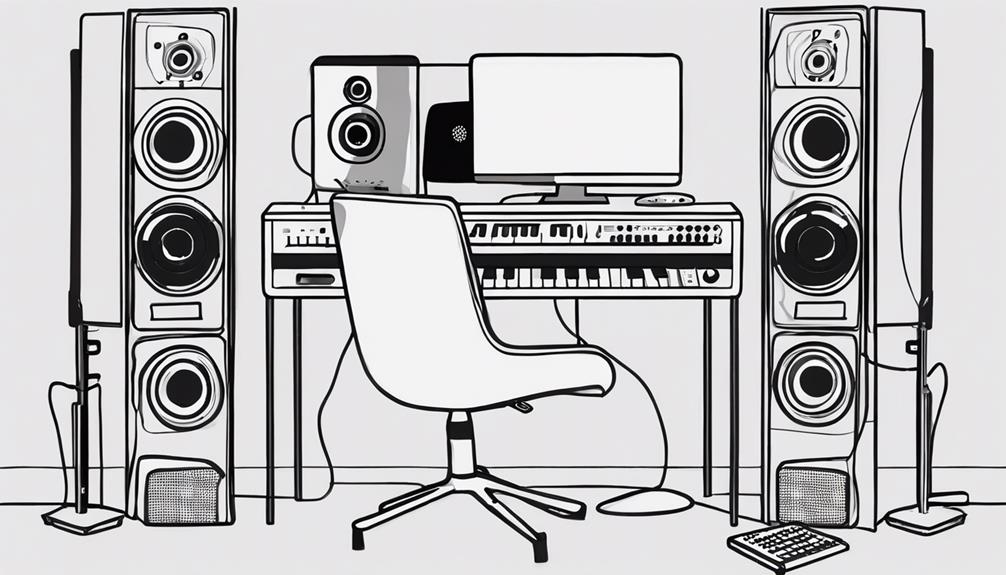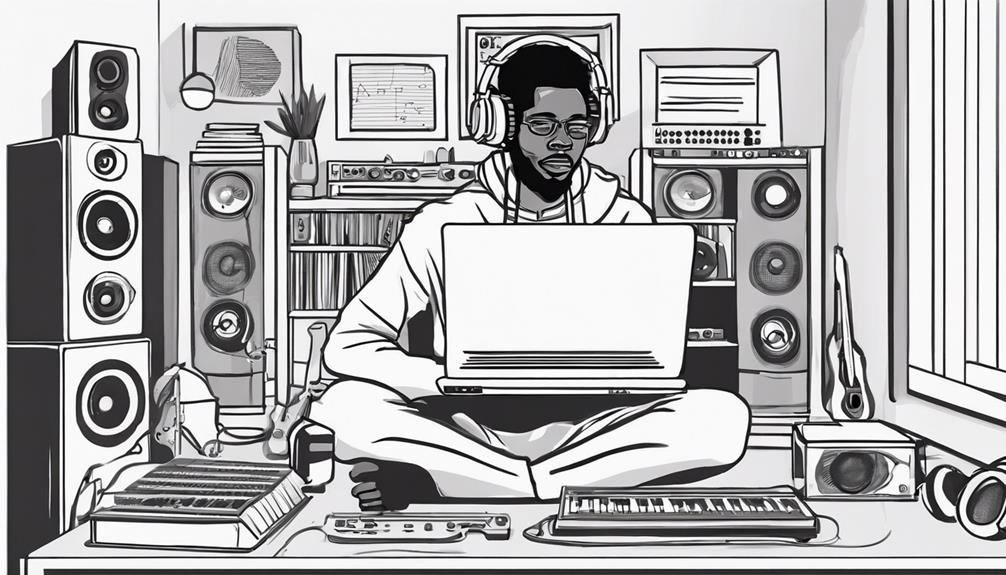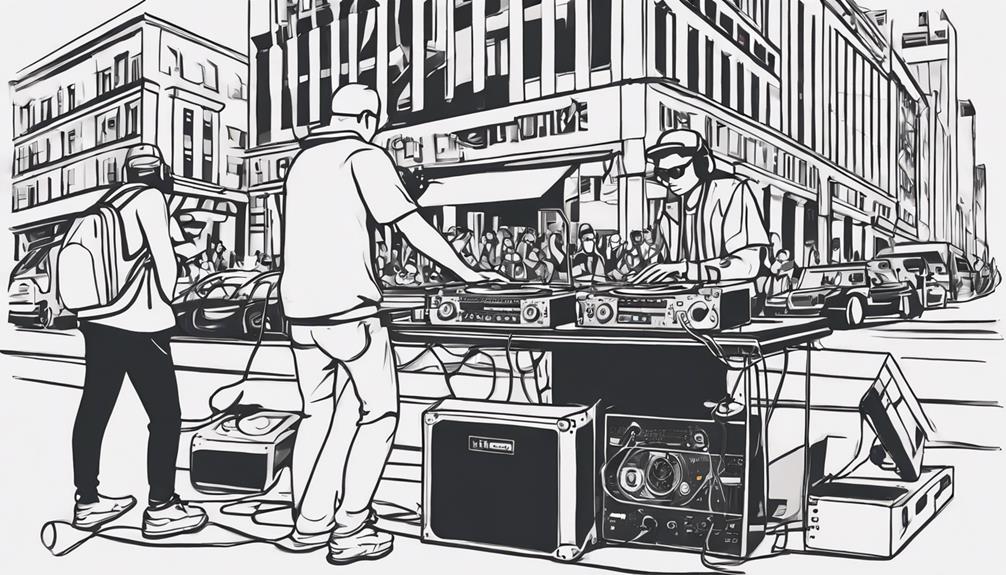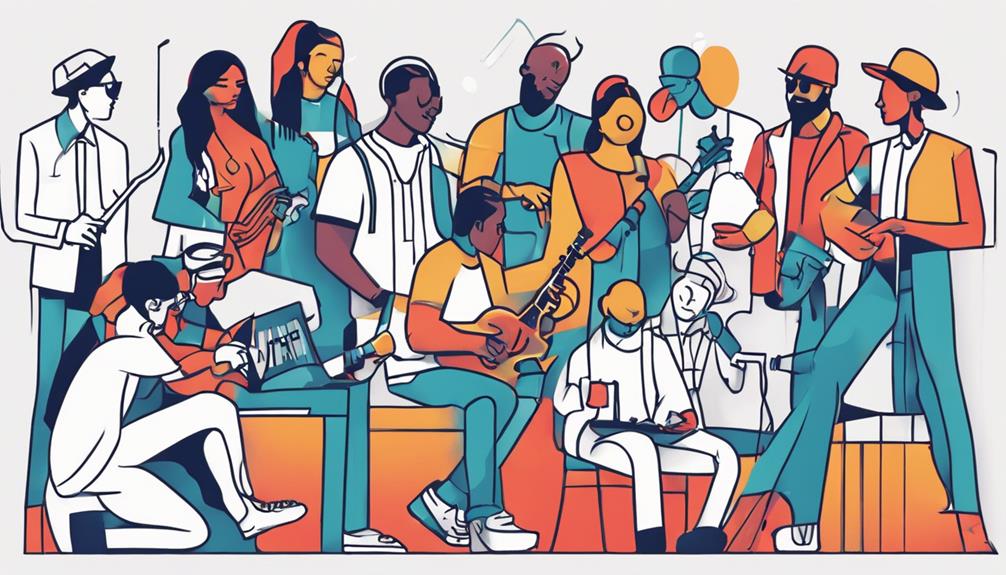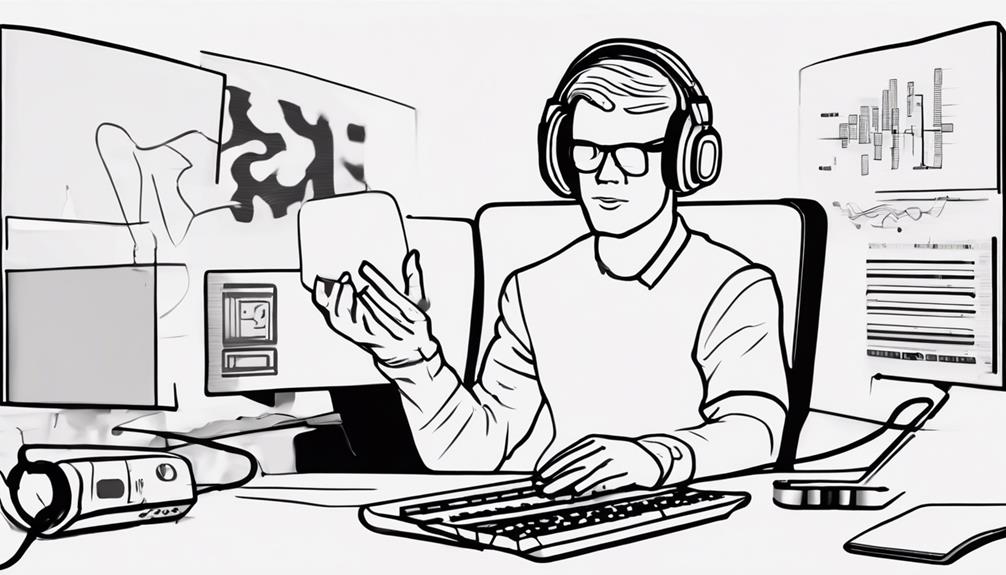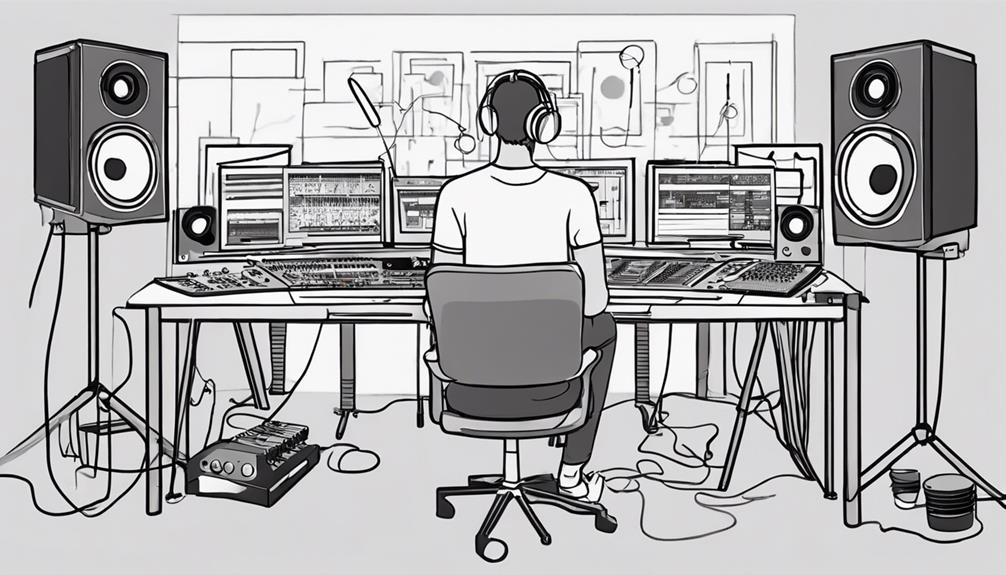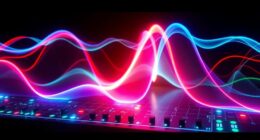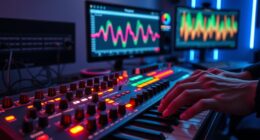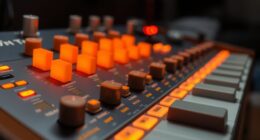To start music production as a beginner, gather essential gear like a powerful computer, a Digital Audio Workstation (DAW), studio monitors, an audio interface, and recording equipment. Understand basic music theory essentials such as scales, chords, and rhythm. Set up your recording area with proper equipment like a computer, DAW, audio interface, microphone, and headphones. Learn music production skills by practicing recording, editing, mixing, and mastering. Explore audio editing techniques using software like Audacity or Pro Tools. Refine your tracks with mastering techniques for balanced sound. Ready to take your music production skills to the next level? Experiment with different plugins and virtual instruments to discover your unique sound and enhance your music projects. Consistently practice and seek beginner tips for music production, such as organizing your workflow and using reference tracks for guidance. Remember, patience and persistence are key as you develop your skills and grow as a producer!
Key Takeaways
- Invest in essential gear: computer, DAW, audio interface, microphone, headphones.
- Learn basic music theory: scales, chords, rhythm, harmony, melody.
- Set up a recording area: consider acoustic treatment, layout, and soundproofing.
- Develop music production skills: practice, experiment, collaborate, seek feedback.
- Master audio editing techniques: cutting, effects, software options, professional sound quality.
Essential Gear Needed
To begin your journey in music production, you must first acquire the essential gear needed. Key components for your music production setup include a computer with sufficient processing power and RAM to handle the demands of recording and editing music.
You'll also need a Digital Audio Workstation (DAW) such as Ableton Live, Logic Pro, or FL Studio to serve as your creative hub.
Quality studio monitors or studio headphones are vital for accurate audio monitoring and mixing, ensuring that your tracks sound great across different sound systems. An audio interface will be essential to connect your instruments, microphones, and studio monitors to your computer, enabling high-quality audio recording and playback.
To enhance your music production setup further, consider investing in microphones for recording vocals and instruments, a MIDI controller for creating melodies and beats, and external hardware synthesizers for added versatility and creativity.
These additional gear pieces will take your music production to the next level, providing you with endless possibilities for creating unique and professional-sounding tracks.
Basic Music Theory Introduction
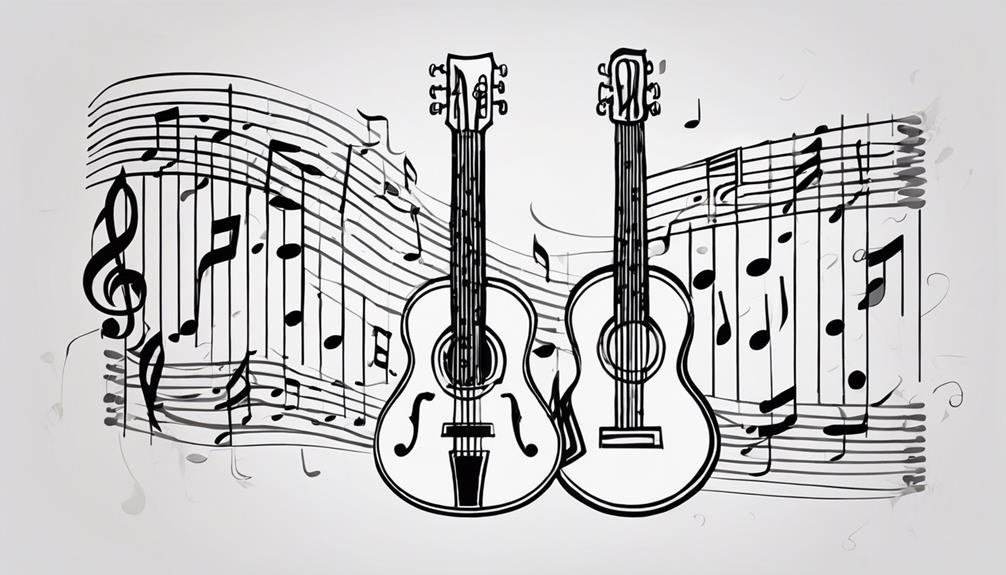
Exploring the fundamentals of music theory lays a solid groundwork for your understanding of how music functions and evolves. Here are some key aspects to ponder as you investigate basic music theory:
- Scales: Understanding scales, such as major and minor scales, forms the basis of melodies and harmonies in music.
- Chords: Learning about chords and chord progressions helps in creating the harmonic structure of a piece.
- Rhythm: Grasping rhythm involves understanding the patterns of beats and time signatures that dictate the tempo and flow of a composition.
- Pitch, Harmony, Melody: These elements are essential in shaping the overall sound and emotional impact of a piece of music, providing depth and complexity to your compositions.
Setting Up Your Recording Area
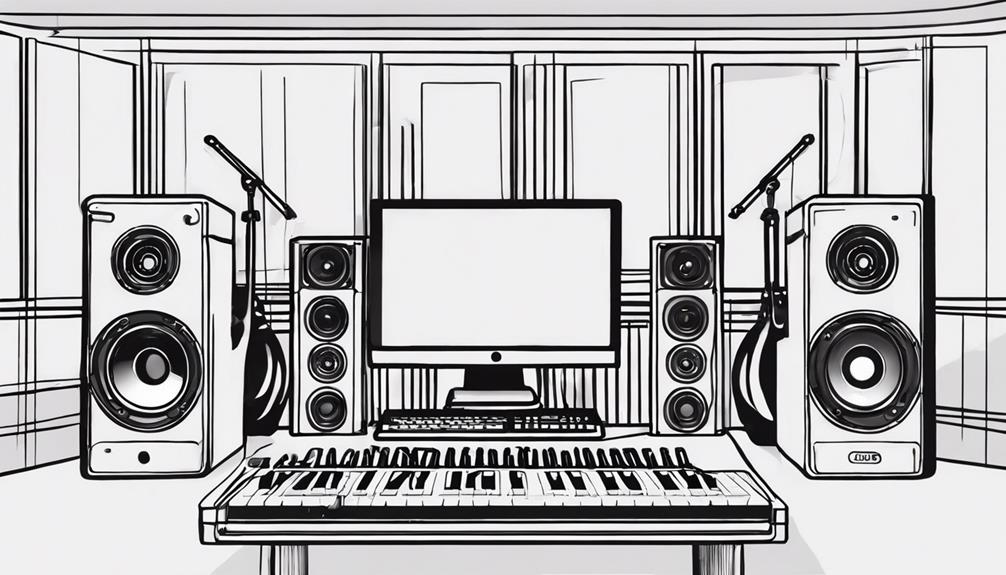
When setting up your recording area, remember to choose proper equipment, arrange an ideal layout, and consider soundproofing options.
These key points will help you create a productive and efficient space for your music production endeavors.
Take the time to set up your recording area thoughtfully to guarantee the best results in your music-making process.
Choose Proper Equipment
Considering the significance of establishing an ideal recording environment, selecting the right equipment for your setup is essential. To guarantee a successful music production venture, here are some vital steps to follow:
- Invest in Essential Equipment: Start with the basics – a computer, DAW software, audio interface, microphone, and headphones are necessary for a functional setup.
- Consider Acoustic Treatment: Enhance sound quality in your recording space by incorporating acoustic treatment such as soundproofing and diffusers to reduce unwanted echoes and reverberations.
- Position Your Equipment Strategically: Place your equipment in a layout that allows for easy access and optimal sound capture during recording sessions, enhancing workflow efficiency and overall productivity.
- Manage Your Cables: Maintain proper cable management to prevent clutter and potential interference in your recording area, ensuring smooth operations and preserving sound quality.
Arrange Optimal Layout
To optimize your music production setup, make sure you arrange your recording area for maximum efficiency and productivity.
Start by ensuring your space is acoustically treated to reduce background noise and reflections that can affect your recordings.
Position your microphones, instruments, and audio interface within easy reach to streamline your workflow.
Implement proper cable management to prevent clutter and potential signal interference, which could impact the quality of your recordings.
Consider the placement of your studio monitors carefully for accurate sound representation and informed mixing decisions.
Additionally, arrange your workspace with ergonomics in mind to minimize strain and fatigue during long recording or production sessions.
By setting up your recording area thoughtfully, you create a conducive environment for creativity and efficient music production.
Consider Soundproofing Options
Wondering how to effectively minimize noise interference in your recording area? When setting up your recording studio for music production, soundproofing is essential to guarantee high-quality audio recordings.
To achieve peak sound isolation and reduce sound leakage, consider the following soundproofing options:
- Acoustic Panels, Bass Traps, and Soundproof Curtains: These materials help absorb and diffuse sound waves, reducing echoes and improving sound quality in your recording space.
- Soundproofing Materials: Utilize foam panels, fiberglass insulation, and mass-loaded vinyl to effectively absorb and block unwanted noise.
- Seal Gaps and Cracks: Prevent sound leakage by sealing any openings in windows, doors, and walls that could allow noise to enter or escape.
- Enhance Sound Isolation: Improve the overall sound isolation by installing dual-pane windows, heavy curtains, and weatherstripping to create a quiet and controlled environment for your music production endeavors.
Implementing a combination of these soundproofing techniques will help you create an ideal recording environment for your music production projects.
Learning Music Production Skills

You can develop your music production skills by learning music theory, composition, and instrument proficiency.
Practice and persistence are key in mastering the art of composing and arranging tracks.
Utilize various resources available to enhance your knowledge and skills in music production.
Skill Development Techniques
Enhancing your music production skills involves consistent practice and exploration of recording, editing, mixing, and mastering techniques. To develop your skills effectively, consider the following techniques:
- Regular Practice: Dedicate time to practice recording, editing, mixing, and mastering to hone your skills.
- Educational Resources: Take online courses or workshops to learn about DAWs, plugins, effects, and sound design in music production.
- Genre Exploration: Experiment with different genres and styles to diversify your music production skills and techniques.
- Collaboration: Work with other producers or musicians to gain new perspectives and insights into music production.
Practice and Persistence
To improve your music production skills, consistent practice and persistence are essential. Regular practice allows you to hone your recording, editing, and mixing abilities, leading to noticeable improvements over time.
It's important to stay vital as mastering music production techniques requires dedication and patience. Experimenting with different software and equipment is also critical in finding what suits your style best.
Seeking feedback from experienced producers or mentors can provide valuable insights and help you identify areas for growth. Additionally, staying updated with the latest trends and technologies in music production ensures that you're continually enhancing your skills.
Resources for Learning
Consider exploring various online platforms, forums, and workshops as valuable resources for learning music production skills. Utilize online courses on platforms like Coursera, Udemy, and Skillshare to explore the fundamentals of music production.
Watch YouTube tutorials and video guides from industry experts for practical insights and tips on specific techniques.
Engage with online forums and communities such as Reddit's r/WeAreTheMusicMakers to connect with fellow producers, share knowledge, and seek advice.
Attend workshops, webinars, and virtual events hosted by industry professionals to gain hands-on experience and insider tips on music production.
Finally, invest in books, eBooks, and digital resources that cover music production techniques and industry insights extensively.
Audio Editing Techniques
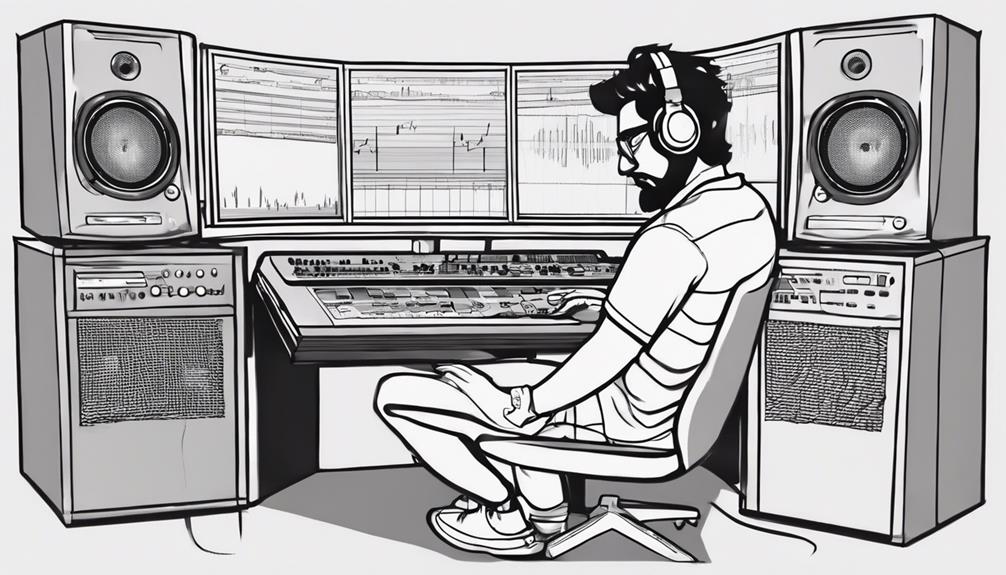
In music production, mastering effective audio editing techniques is vital for refining and sculpting your sound. Audio editing involves manipulating recorded audio files to enhance quality or make creative changes.
Common techniques include cutting, copying, pasting, and trimming audio segments. Applying effects like reverb, EQ, compression, and delay can further enhance the audio during the editing process.
Utilizing software such as Audacity, Adobe Audition, or Pro Tools provides a range of tools and features for precise editing. For beginners, understanding these techniques and tools is essential to achieving a professional sound quality in music production.
Mastering Your Music
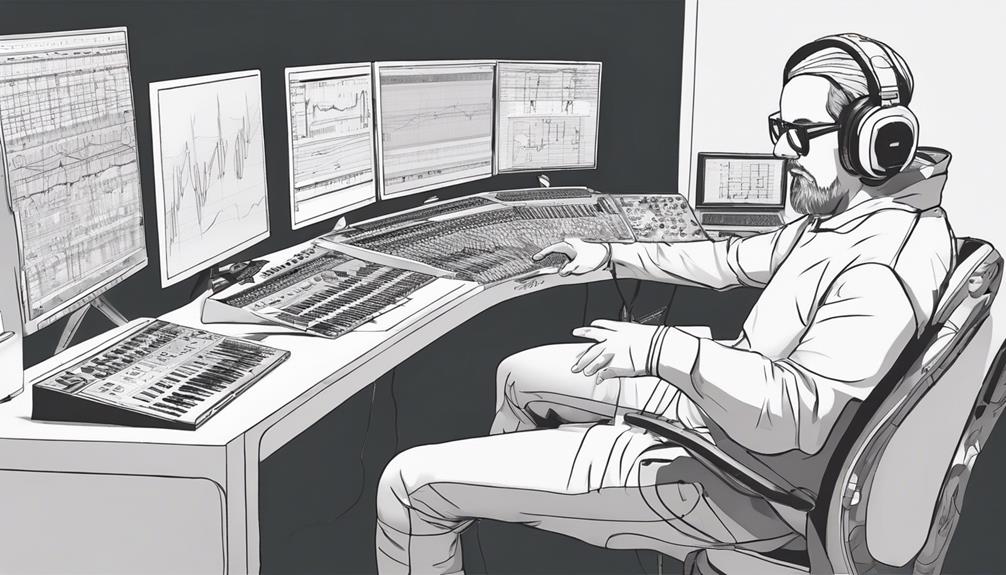
Mastering your music involves refining the overall sound of your tracks to guarantee they're optimized for various playback systems and ready for distribution.
When mastering your tracks, consider the following key steps:
- Adjust Levels: Make sure the volume levels are consistent throughout the track to prevent any parts from being too loud or too soft.
- Fine-tune EQ: Use equalization to balance the frequencies in your mix, ensuring each element has its own space without overpowering others.
- Apply Compression: Control the dynamics of your track by using compression to smooth out peaks and make the overall sound more cohesive.
- Enhance Stereo Imaging: Create a sense of space and depth in your mix by adjusting stereo width and placement of different elements within the stereo field.
Frequently Asked Questions
How Do Beginners Start Producing Music?
To begin producing music as a beginner, start by choosing a Digital Audio Workstation (DAW) and essential equipment. Learn basic techniques, experiment with sounds, and engage with online communities. Consistent practice will help you improve.
How to Produce Music Step by Step?
Begin a creative journey through music production. Craft melodies, layer beats, and mold sounds. Immerse yourself in your Digital Audio Workstation, ignite your passion, and explore your sonic vision. Transform raw ideas into vibrant tracks.
What Is the First Step to Becoming a Music Producer?
Diving into music production? Start by pinpointing your interest – music creation or business management. Choose your path to focus your efforts and clarify your long-term goals. Tailor your learning to specific music industry areas.
Can I Teach Myself Music Production?
You can definitely learn music production on your own. Immerse yourself in online resources, experiment with software, and embrace the journey of self-learning. With practice, patience, and a thirst for knowledge, you'll master the art of music production independently.
Conclusion
Now that you have the essential gear, basic music theory knowledge, and recording area set up, you're well on your way to becoming a music producer!
Did you know that over 70% of music producers are self-taught? So keep practicing, honing your skills, and experimenting with different techniques to create your own unique sound.
The possibilities are endless in the world of music production!

